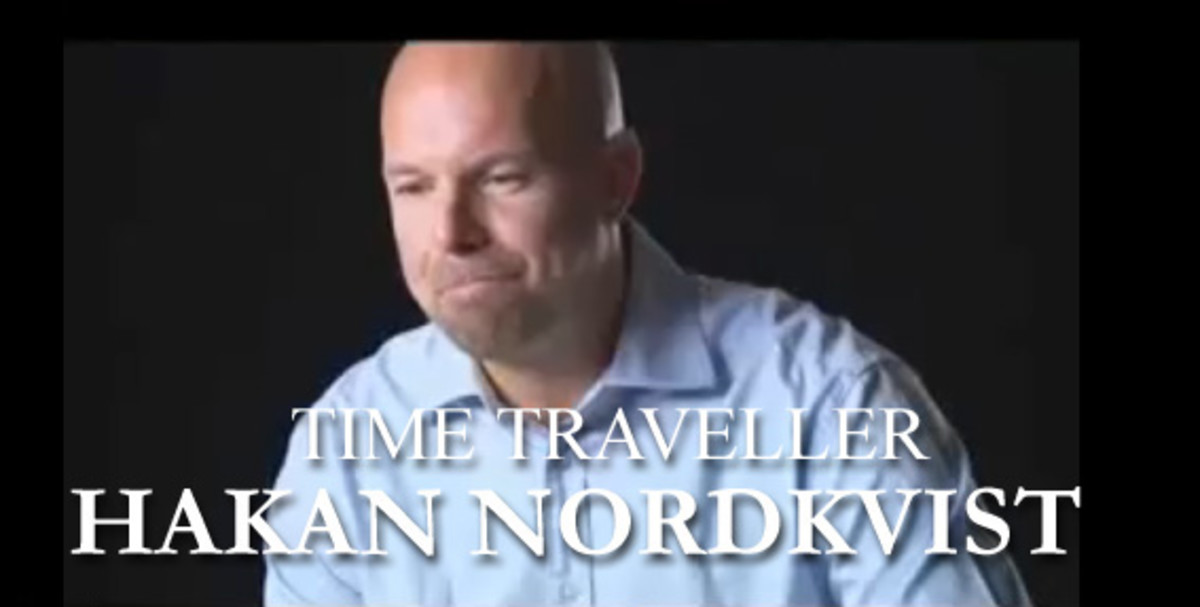Magnolia ~ Beginning the Odyssey

Prologue
He was a "boomer" - a late boomer; "late" because he was born later in the boomer decade. His older brother was an earlier boomer. But their relationship is to come later on in the story. Let me first set the stage.
If you happen to be unfamiliar with the term, "boomer", it's a nickname for one of a group of persons born in America during the decade or so of aftermath of WWII. "Boomer" is a version of the more formal term for that generation: "Baby-Boomers", so called because of the sizable "boom" in births which followed the return from the war of men to the women who waited for them.
It is a unique generation, born and reared in a post-war epoch of conflict hiatus and surging economic boom, with youngsters having more "things" than a preceding generation could have imagined. The boomers' parents grew up during a Great Depression when things were extremely scarce and they came of age with the outbreak of WAR, when things were extremely rationed because all focus was upon making sure the troops were well-supplied with necessary things to win battles and end the war, making the world better, safer and more prosperous. It was a time of hope, intensity, patriotism, and loyalty, with few if any questions asked. They could hardly have visualized the prosperity which would follow.
Boomers, however, knew nothing of this lack of things except as they were told about it. Those stories were virtually incomprehensible to them. They always had and expected to have ample things and creature comforts. They'd never needed to plant a garden or to "make do". Tales of doing without and having to walk to school sounded like fairy tales used to get them to eat all the food they'd put on their plates and to be wiling to wait for their first car till the law allowed them to drive it!!
Having things and privileges in that sense was simply taken for granted. Whatever the frustrations for some of them, those would take quite different forms, creating real and debilitating psychological dimension, becoming occasionally so severe as to haunt them all their lives with lasting effects.
The simple fact was that having everything meant more time for introspective mulling over more subtle effects and awareness of different kinds of real or perceived lacks in more intangible areas, while their parents still believed kids had no sensitive 'nerves' to go awry, so that they had little comprehension of kids who had almost everything having psychological issues. Fact is, if truth be known, the parents' generation had little if any concept of psychology at all; they didn't "believe in" what little they knew of it!!
There was a real "generation gap"; - no, make that a gaping chasm having less to to with age differences than with life experiences making them practically like creatures from different planets!
Sonny's story concerns some of those factors.
But first,we need to understand how it all came about. The War . . .
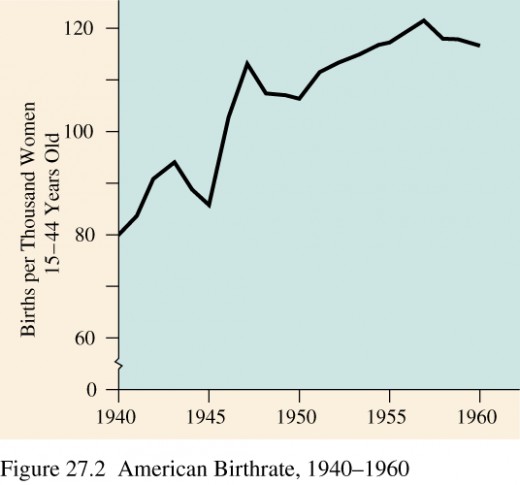
"Baby Boomers" Change the Graph!
And so it was that the boomers were to fill a gap when babies had been few, - first with the Depression limiting incomes and hopes of "normal" living; and then with the men of child-bearing age off fighting the WAR and the women at home working in war plants or collecting "savings stamps" to buy with ration stamps the substitutes for "things" like leather items, meager supplies of sugar, gasoline, tires, meat and other daily consumables they needed for themselves and/or for any children they already had.
"Luxuries" and "discretionary buying" were largely unheard of except among the very wealthy. Necessities - (most consumables – and all which were of of the highest quality) - were reserved for the fighting men off defending the country and the principles it had always stood for. Substitutes were found, made, or grown - or else the "home front" did without.
Uncle Sam Wants YOU!
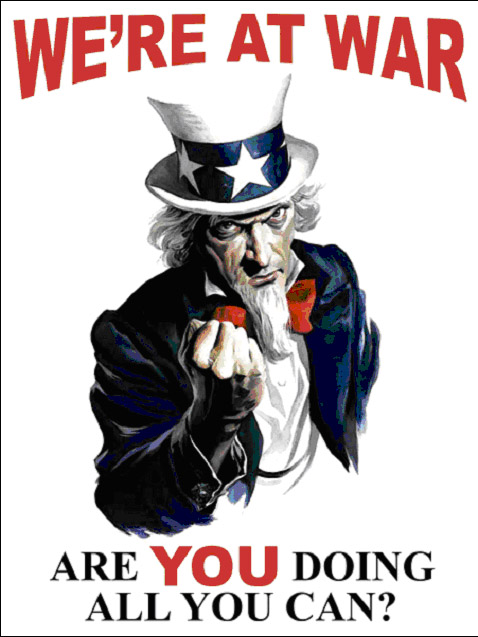
It was regarded as a supreme privilege, though, rather than as a burden to sacrifice what one could for the sake of the effort and to assure the safe return of loved ones.
When Uncle Sam Wants YOU posters were seen, it was like a personal challenge – a call to arms, even for school-age kids. We knew we could do our small parts. We could save and invest our meager allowances to buy small denomination savings stamps to accumulate to trade in for greater value bonds. These would help finance the equipment and goods needed to wage the war and to win it.
We could happily accept lacks of the rationed items. We could help plant the family's "victory gardens" and clean our plates rather than wasting precious food. We could do what we were able to help - cheerfully. That was the mood of the country and we subscribed to it just like everyone else did.
After all, we didn’t HAVE to have leather shoes! We much preferred that "our boys overseas" should be well shod as they trod into dangerous far-off battlefields and fought for all our rights to be free Americans. Various alternatives for the rationed items would serve just as well.
No one entertained a thought that the slogans might be a bit propagandized to be sure we felt that way. In fact, we almost naturally did feel that way. Our country needed us - and that was that. Even young kids were eager to do our parts, no matter how slight they might be. At school we sang the anthems of all the branches of service, along with "Over There" and "Any Bonds Today" - ". . .bonds of freedom, that's what we're selling, any bonds today. . . ." It was heady stuff.
Ration stamps- in MY name! Mother had to sign for me, but I was entitled to a share of them
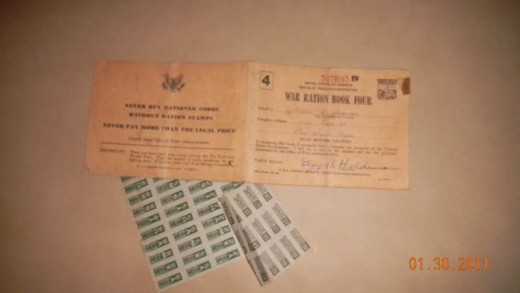
Buy Bonds - and we did!
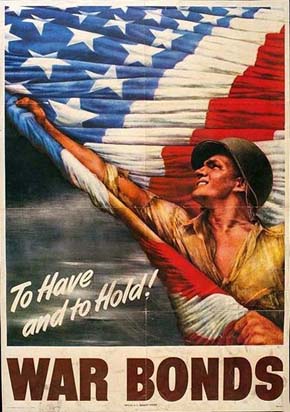
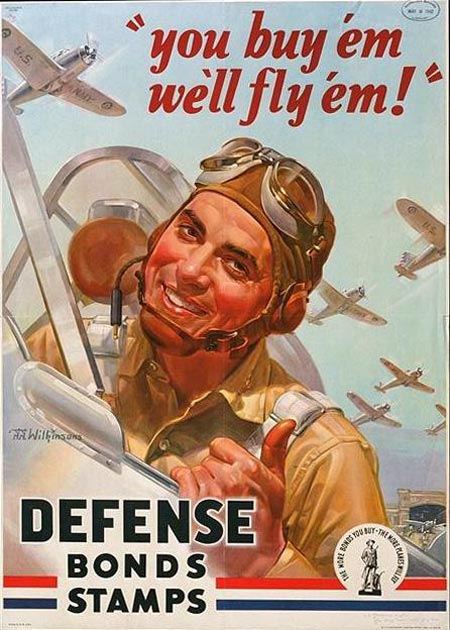
And those young folks among us who were older and qualified to have found their future mates or to wish to find them as soon as possible just wanted them to win and come home to them more than they yearned for anything else on earth - or in heaven if that were to be a choice.
No urging was required. They WANTED to do their parts. But there were slogans and posters everywhere one went. They strengthened resolve and encouraged dedicated support of "the war effort". Jobs in war plants were filled with women old enough to work. Most had no better calling during those years and all wanted to do their bit.
Families in smaller towns having limited extra housing to accommodate the swarm of young wives who followed their husbands stationed in nearby newly opened military bases opened our homes and offered our "spare rooms" to these wives of the servicemen. If more space were needed as new arrivals came, the local families willingly sacrificed our own bedrooms and slept on sleeping porches even in the cold of winter in order to provide for momre young wives - and sometimes their children, too - of those guys not yet dispatched to the scenes of battle overseas.
One could almost feel the determination and spring-like tension in the air. Even little kids felt it. Some of us gave up our warm beds so another wife could be near her man - maybe for the last time, EVER.
She'll do her part, too. . .
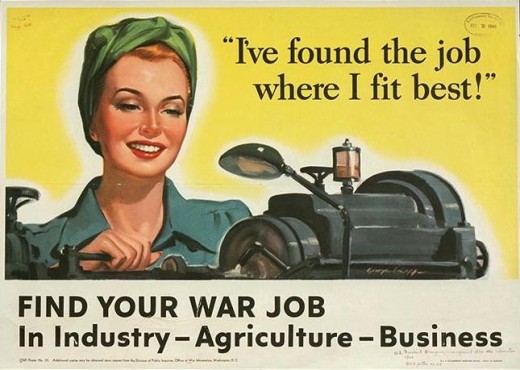
So throngs of nubile young women simply kept productively occupied while waiting for the day when the guys would return to claim them in marriage. Some wives, such as those who shared our modest homes, simply worked and waited to resume the normalcy of marriages they’d already begun when war broke out. Some had even married quickly, just before the guys shipped out to do their duties.
But no one complained though all were anxious in a positive sort of way.
The nubile young single women sometimes volunteered as hostesses at the local USO (United Services Organization) which provided respite for the young servicemen stationed nearby who had no families, friends or relatives in the area. It was a place for them to go on weekend evenings, hear Big Bands music, maybe dance with a pretty girl and forget about any anxiety they might have about possibly being sent into the heat of battle in some remote and lonely part of the globe - and possibly ending their lives there.
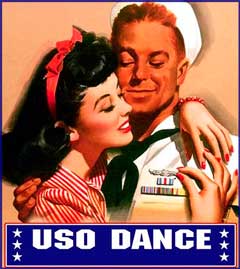
Those young women kept themselves busy and looking pretty, both for those USO occasions, and for the day of the return of their husbands or boyfriends, if lucky enough to have them; or, if not, perhaps hopefully, to find someone some evening while pitching in at the USO. Otherwise - to be ready for the end of the war when more opportunities would be possible. Sloppiness in grooming or in personal appearance or behavior was so rare as to be unmentionable. They had grown up in traditional homes, learned manners and demeanor from full-time mothers, and expected to emulate those examples when they became mothers. Little knew they how different things would become with the end of the war and the start of technology and other sweeping changes in the aftermath of all that had preceded its hiatus.
We must bear in mind that young women of that era had no thought of remaining single or of having no families. The "career woman" was a Hollywood invention, played on the silver screens by Rosalind Russell or Bette Davis. The movies depicting the hard-nosed business women of that period were almost deliberately shown as farcical romps in which at the end the hard-hearted Hannah fell in love with the (usually nice looking but slightly bumbling) guy and happily relinquished the glitz and glamour for the comfort of having a sparkling "all electric" washing machine and "a man around the house" to boss around it. No one took these fantasies too seriously, since there were as few real examples of successful career women as there were real Mickey Mice and Popeye the Sailor men. There were none, in fact, other than these caricatures wearing tailored jackets with shoulder pads equalling Peyton Manning's or Hulk Hogan's wondrous shoulder dimensions!
But still, as changes in lifestyle after tje war began to impose on families a seeming need for "two incomes" to sustain the new affluence, at first women knew no other examples when they needed to add outside work to their roles as wives and mothers. Some of the hard-nosed attitudes seemed necessary, inasmuch as men were unused to working with women. When they'd worked in the war factories, there were virtually no men involved!
So - until they regained their natural composure and equilibrium enoujgh to establish their own ways of handling the demands of more tumultuous times, both for families and outside jobs, there were some frantic efforts along the way of discovering who and how they should be in peacetime workplaces.
They and their well-off families with and expecting so many more things began to feel the strain of increasingly more fragmented family lifestyles.
But before and toward the end of the war, reality prevailed for the time being in which real women remained aware of their destinies as simply more modern versions of traditional wives and mothers, which roles were accepted with dignity and honor, contrary to what retrospect sometimes makes of that era now.
Moreover, the experience many of them had gained by working in the factories and other positions for the war effort changed few, if any, of their basic ideals. What it did do was highlight their strength and value, bringing them far beyond the repressive roles of most women of the Depression era, and it added a valuable dimension of self-worth to their traditional roles and challenges in postwar America.
Having worked outside home successfully improved their lot in life in it but for the time being, failed to tempt them to wish to swap the home for for the golden umbrellas "up there somewhere" unless hopes for a home and family passed them by.
Women In WWII
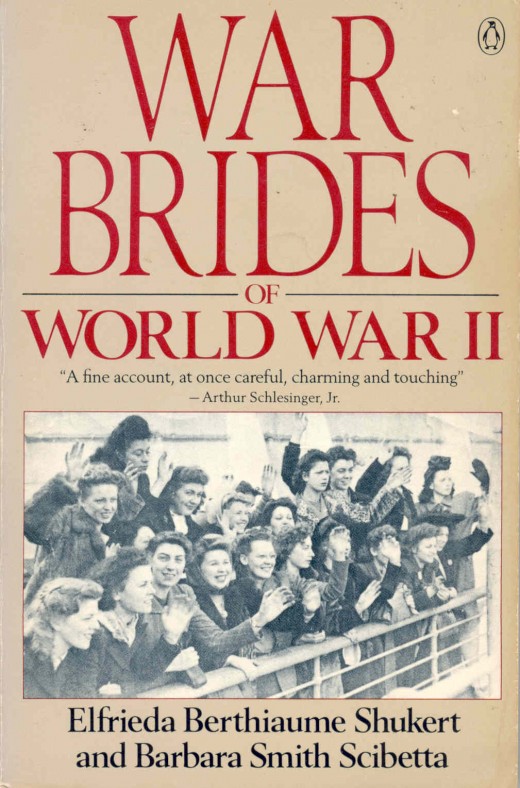
So meantime, when the "troop trains" still pulled out of the local station, carrying the guys who had received orders to report to a dispatching hub, there were always local young women lining the platform, waving and peering anxiously into the train windows, hoping for glimpses of THIER guys waving and looking out into the throng for THEM.
Longing for normal life mounted with each month and year the war went on and with each goodbye to loved ones.
But to the younger of us, who might be there to wave goodbye to a brother being shipped out, the romance which seemed to fill the air seemed as real to us as the wartime movies of brave men having to leave brave loving women, which we could almost imagine ourselves as being. We had no real concept that the war would actually END. We were growing up with it and it seemed to determine everything which occurred.
Surreptitiously our own roles in postwar America were being shaped by circumstances of the war and its effects on people. The cacophony of our exposure to life around us would shake the roots of traditions as we moved into maturity. We held to ideals of womanly roles, yet the examples all around us were somewhat confusing. Little did any of us know that times of relative stability and familiarity were rapidly vanishing and that our generation would never be able to claim a single lifestyle for an entire lifetime.
Community tranquility was a thing of the past. Only personal tranquility was to be possible and it would be challenged continuously by an accelerating parade of mind-boggling change.
The following video gives a peek into the spirit of those times. No one loves war, I, least of all, but I believe fully in supporting our young men and women who are forced into fighting them, whose idealism encourages them to risk life and limb for what they hope will help maintain our freedom and promote it in other parts of the world. While I question the logic of that, - warring to protect and establish peaceful coexistence - I have to support and applaud the heart and hope that causes young folks with lives ahead of them, with young wives and families left to hope and pray that they will return and be "whole". They deserve our love and support - now as much as when Rae Wilson turned an obscure town in Nebraska into a citadel of hope for such young service men and women during WWII. I dare you to watch with dry eyes.
North Platte Canteen
Newsreels
We were accustomed to getting news days or even weeks after it happened, though. Even newsreels ground out stale news, spiced up with slogans and positive glowing claims of successful battles and negotiations. Nevertheless, they were the only animated coverage there were to be had. It would be another decade or so before the first televisions became available to the public and it sill took time for the news coverage to catch up with real time, and more for it to become as instantaneous as it now has become.
Timing had never been instantaneous before, though, so who knew or cared if it wasn't simultaneous with the events? But delays offered ample opportunity for media interpretation of the news that was available, creating a natural "feed" for various kinds of propaganda and opinion manipulation.
But before the war's end, in between the showing of movies in our local theaters, there still were many "short subject features" including the RKO-Pathe newsreel covering battles and diplomatic events, often with jumpy black and white film which sometimes disengaged from the projector in that little room above the audience. You'd hear a distinguishing, diminishing "flip, flip, flippp-p-p" sound as the screen went dark, leaving you in tense suspense as they fumbled around reloaded the film and finally got it started up again.
Lest we forget and Fail to Learn . . .
Needless to say, everyone was united in noble support of the war effort and rejoiced when it ended.
But as it had worn on, hearts had been heavy for countless separated lovers, especially when night fell and anxieties returned to delay much needed sleep. These young men and women, as well as other family members of servicemen, were alike all sworn to secrecy regarding their fellows' locations, lest critical information be leaked inadvertently into enemy ears. Posters advising "sealed lips" were rampant. It was a nation gripped by one purpose - successfully ending the war and winning the peace. Those were not empty slogans for any of us. And reality clarified many of the glossed-over issues which became more apparent to us as the wars dragged on and more and more lives were lost. We knew there needed to be a better way to settle conflicts. But we didn't know how. It was an age-old dilemma which no generation ever can fully escape, nor has any succeeded in resolving it.
The ravages wrought by nations settling differences on battlefields are never escaped by the families and environs of civilians back home, either. There is a toll which has no measure and is felt for many years by many people far into the aftermath.
Certainly any of us who were among pre-war, pre-baby boomers who vividly remember that shared spirit of unity, purpose and dedication to a cause which seemed reasonable, sometimes have trouble with a prevailing angst and dismissal regarding our country's better motives and ideals and we must grieve for the loss of innocence of those times.
Even being realistic with clarity of vision to observe what seems to be a dramatic decline in ideals as well as an emptiness of purer motives, - still those bright and shining memories of the citizens' honest support of a purposeful effort by earnest fighting men in times of great stress are etched into us and are hard to remove. We need to feel as that felt, even in the face of evidence to the contrary that it was as honest and well-intentioned as we thought then. This yearning is apolitical; it's born not of desire for more clever manipulation of answers to perplexing problems to justify selfish motives, but of the quest for answers, answers based on common sense and reason rather than hasty habitual resort to the taking up of arms whenever anything seems unsolvable.
What we most earnestly desire - and would hope to share with those of later generations - is the restoration of, - or the institution of - real honor and justice both here and abroad.
We fervently hope to be able to work with other nations to achieve it for all, everywhere - not just in our own back yards.
Supreme sacrifices . . .
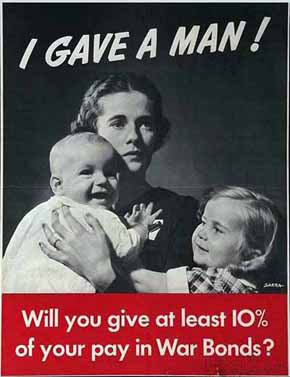
So that being said and the background for our story being painted with broad strokes and dramatic colors, - let us get on with the story of the late boomer we'll simply call Sonny.
You see, the war did come to a close, although to many of us, the manner in which it ended was a tragedy in itself. More lives were lost in the H-bomb tragedy than had ever been lost in a single bombing, if not in any single battle ever waged. It was intended to stop the ongoing parade of tragic seemingly endless battles with countless lost lives which were in progress. But to many of us, it was much too high a cost in innocent human lives to have deliberately paid, knowing there was no recourse for them
Once done, though, it was done. The war ended on that front and soon would end on all others. Our surviving brothers, dads, kinsmen and friends over there, soon began to come back home to us. Sweethearts began to be reunited and soon afterwards, babies began again to be born - in record numbers . . .
So next you will meet our boomer and his family.
Yes, The Boom was ON! And postage was cheap!
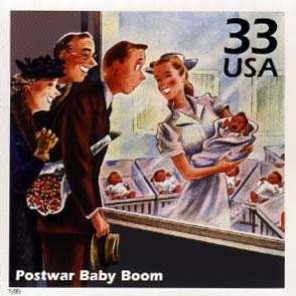
See Next. . .: Magnolia-opus 1








